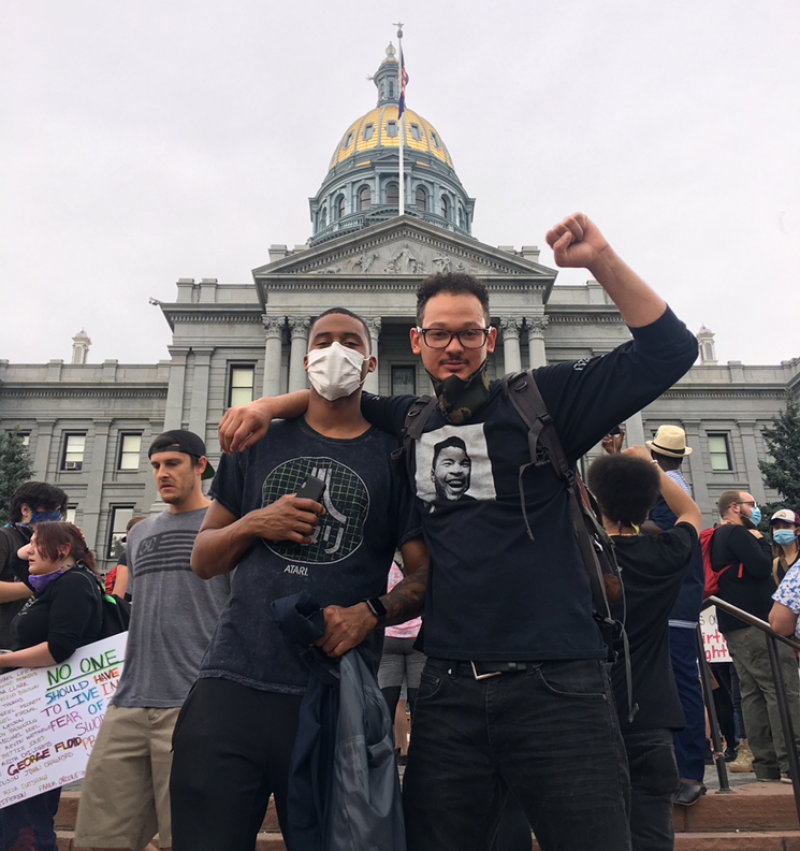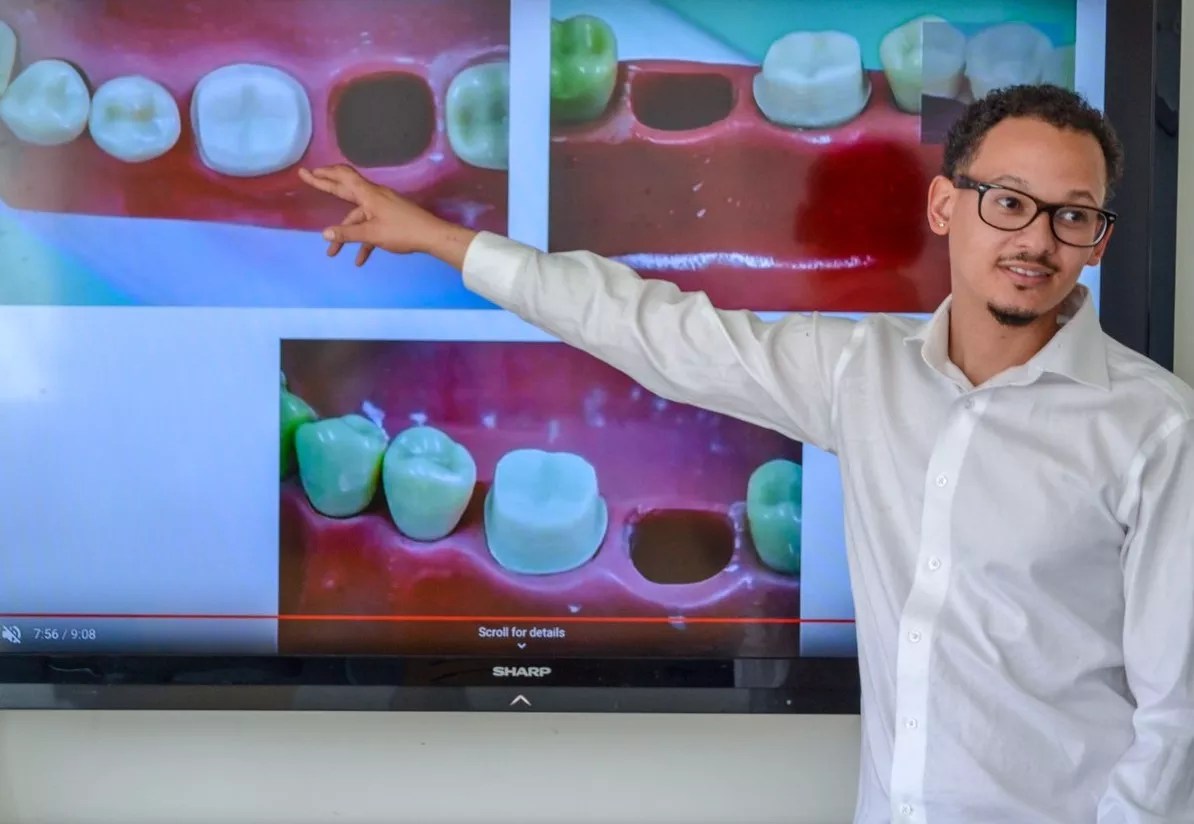
courtesy of Stanford Smith

Audio By Carbonatix
On Saturday, May 30, feeling a call to let his voice be heard, Stanford Smith drove from Aurora to Denver to attend the third day of the George Floyd protests at the Capitol.
“It was just something in my soul that I had to do it, I had to go. To go and support something that I believed in,” says Smith, a 31-year-old dental student at the University of Colorado.
Instead, he got a faceful of pepper spray from a cop, causing hours of agony and days of discomfort. Although he’s largely stayed away from demonstrations since then, he’s not done protesting: Smith is one of the people now suing the City of Denver over the way that law enforcement treated them during the demonstrations.
The son of a white father and a black mother, Smith had experienced his fair share of discrimination by police while growing up in Dallas. “When I was in high school, my first time being pulled over, a cop walked up to me and had a gun in his hand,” he recalls. “He didn’t even know who I was, and just walked up with a gun in his hand. Just for speeding ten miles per hour over the limit.”
But even with his background, the crowd he found at the Denver demonstration had him in awe. “It was something I’ve never seen before,” Smith recalls. “People expressing their emotions, expressing their feelings that have been built up for years. You grow up with these images of fear, and I saw these people. It wasn’t fear. They were tired. They were tired, they were desiring justice, equality, equity, and there wasn’t just one person or one race. It was multiracial. It was something that I had never really seen before.”
But there weren’t just protesters there; law enforcement officers were also nearby. During the two previous days of protests, police and other law enforcement officers had deployed tear gas and other less-lethal munitions to quell certain protesters characterized as “rioters.”
Now, near the Capitol, Smith realized that there were kids around and that some could get hurt if the situation turned violent between the protesters and law enforcement officers, who’d already formed a line.
“I was asking police, ‘Hey, please don’t get violent. This section can show all of Denver that we can protest peacefully and have a cause being heard,'” Smith recalls. “I also said to the protesters, ‘Don’t get too close to them. Give them their space, so we can be out here without any problems.'”
Smith is someone who cares about helping others; that’s why he’s working to become a dentist. When he shadowed a dentist in Texas, he recalls, “People would come into the dentist office covering their mouth or covering their face because they wouldn’t want to people to see them without their teeth or with missing teeth. And then they would leave smiling. It touched them; it touched their soul.”
When Smith reasoned with officers at the Denver protests, it seemed to have a positive effect. “The police were appreciative. One of them fist-bumped me,” Smith says.
But then another law enforcement officer came up from behind the line and aimed pepper spray directly at Smith’s face.
“When they sprayed me, all of my emotions that had built up turned to one, and it was fear,” Smith reports. “I just had to get away. I felt my face was on fire. It felt like a liquid fire was on my face. My eyes, I couldn’t open anything, I couldn’t see anything. I was just trying to get to safety.”
As he fled, Smith tripped and fell. Some nearby protest medics helped him up and poured milk over his face and eyes. “As they were pouring it, I felt an immense amount of relief from the cold. It was like taking my hand out of fire and putting it into water,” Smith says.
But that relief didn’t last long, and Smith’s face soon felt like it was on fire again. Eventually, other protesters took Smith to paramedics, who put a soothing solution in his eyes.
As soon as Smith got home, he ran cold water in his bathtub and then spent the night in it. When he woke up, his skin was hard and crispy. “It felt like snake skin,” Smith says. After a few days, the skin peeled off.
Although he suffered physical discomfort for days, what bothered Smith most was the fact that a law enforcement officer had used force against him for no reason.
“When an officer wears a badge, it’s supposed to be like, ‘I am a representation of the law,'” Smith says. “But how is that being reflected if they’re a representation of law enforcement and the law doesn’t protect a segment of ethnicities? It’s just kind of hurtful and just degrading. I am asking for equal rights, asking for justice, asking for police to be held accountable for the things that they do, just like everybody else.”

Dental student Stanford Smith is now suing the City of Denver.
Courtesy of Stanford Smith
In recent weeks, protesters haven’t been the only ones who’ve criticized law enforcement’s treatment of them; elected officials have, too. In early June, the city was hit with its first lawsuit over the police use of force against protesters; it’s already resulted in an agreement between the city and plaintiffs in that case that restricts the use of less-lethal force by law enforcement in Denver. Smith, along with eight other individuals and the Black Lives Matter 5280 organization, is part of a second lawsuit filed against the city claiming excessive use of force during protests.
For Mark Silverstein, an ACLU of Colorado attorney who is among the lawyers representing Smith and the other plaintiffs in that federal lawsuit, “What happened to [Smith] just rebuts one of the narratives that the city is putting forth,” he notes.
“They’re saying they’re always responding to the protesters who are throwing things at police and provoking police. Here’s someone who was specifically saying, ‘Be peaceful, get off the street,’ and actually trying to de-escalate any tensions that might have been building. It appears that he was singled out and got pepper-sprayed as a retaliation for his peacemaking efforts,” Silverstein says.
The lawsuit argues that law enforcement’s use of less-lethal force against protesters violated their constitutional rights.
“Somebody can be chilled from exercising their First Amendment rights,” Silverstein explains. “They’ll think, ‘I’m not going down there. The police violence is going to make me worry about whether I can safely express my views or add my voice to the voices that are assembled.'”
And that’s how Smith is feeling now. He tried going back to a protest, but as soon as law enforcement officers showed up, he left. “I was intimidated to be out there,” he recalls. “I didn’t know what could happen. I just felt bad knowing that I didn’t have a voice anymore. It felt bad, like a voice had been beaten out of me.”
He would like to voice his feelings to the cop who sprayed him. “If anything, I just wish i was able to talk to them,” he concludes “I’d say, ‘Hey, man, why did you do that? Were you afraid of me? Because I was asking for peace.’ That’s what I would ask him.”